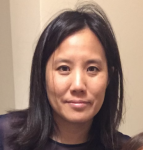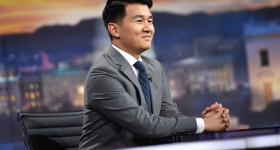On a sunny morning on San Francisco’s iconic Cole Street, I met up with F.C. Yee, the author of the young adult novel The Epic Crush of Genie Lo (Amulet Books, 2017). This confident, well-spoken, first-time author, who holds a day job at a mobile games company, has crafted a pioneering novel that reworks Asian legends and myths into a South Bay high school setting.
The novel centers around Genie Lo and her relationship with a teenage boy, who (spoiler alert!) turns out to be a reincarnation of the monkey king from the sixteenth-century Chinese novel Journey to the West. As the story progresses, Genie surprises herself as she discovers her own powers to save the world from a league of demons.
Read our conversation below. This interview has been edited for length and clarity.
–Evelyn Nien-Ming Chien, Senior Books Editor
Evelyn Nien-Ming Chien (EC): How long have you been writing?
F.C. Yee (FCY): Since college, but I didn’t start with long-form fiction. I wrote mostly short-form articles for the campus humor magazine. I was the editor in chief of the The Brown Jug [at Brown University]. And then after a couple of years working after college, I wanted to do something creative. At first, I wanted to write comic books, but that required a lot of collaboration. One of the reasons I got into long-form fiction was because I didn't need a partner. But then I had to figure out long-form fiction... There was a lot of trial and error there: starting a project then dropping it, trying to figure out where it fit into the fiction market. Eventually, I realized that what I wrote appealed to the young adult readership.
EC: What was the process of The Epic Crush of Genie Lo getting picked up?
FCY: Once I had finished [the book], I realized I wanted to spend more time on revising and editing before I sent out any queries to agents’ slush piles. I took it to the only conference I've ever seen that promised faculty would read the whole book— the Pacific Coast Children's Writer's Workshop, run by Nancy Sondel.
The one problem though is that [conferences] can get very expensive to attend. I did have a lot of privilege in that way — my day job gave me support in that area. I'm a product manager in mobile games. I would do that during the day, and I would write in the morning.
It just so happened that of the two faculty members in the year that I brought Epic Crush to this conference, one was an agent Stephen Barr with Writer's House and the other was an editor with HarperCollins, Kristen Pettit. Stephen Barr ended up reading Genie Lo and then giving me lots of great feedback.
After the conference and over the course of a couple of months, I sent [Barr] revisions based on his feedback. After maybe about three months, he sent over an offer of representation and signed it. Then the next couple of months he prepped it for submissions to editors, sent it out to a bunch of different editors, and a number of them expressed interest. He arranged an auction in, I think, May of 2016, and then that's how I chose Abrams Books.
From that point on to the date of publication, it was all a process of editorial revisions and attending some advanced conferences and festivals to drum up buzz and to figure out things like cover title. That went all the way up until August 2017, then publication. I've asked Stephen, "Is this a typical path?" He says it's not the most typical for a debut author, but definitely, yes, sometimes debut authors do meet their agents or editors at a conference.
EC: What’s the energy and diversity like in the literary conference you’ve attended?
FCY: The amount of work being done by members of the reader community to push diversity forward in publishing is massive. We’re talking about a community of fans demanding that change from outside the publishing industry itself. It’s a wonderful, positive force. In conferences and in personal gatherings, you definitely feel that energy. You also see it in the online discourse. The amount of generosity that the wider readership has towards authors and books and publishing in general is overwhelming. In fact, authors are reliant on it more than I realized.
The sheer amount of goodwill and positive energy of fans, it’s a key component of this whole process. Of course, having the inspiration of a character as rich as the monkey king helped me. As far as Genie goes, my brother-in-law joked, "Is Genie is just a taller version of your sisters?" In many ways, yes: the way Genie responds to frustrations, injustice, things not being fair or right, and her tolerance for other people's bad behavior. I grew up seeing that type of emotional responses as more typical. To me, a lot of her reactions are very natural.
EC: There's a lot of the Bay Area in the book, so I’m interested in your geographical origins or background as they relate to the book.
CY: The early part of my life was very East Coast–centric. I grew up in New Jersey, went to a boarding school in Massachusetts, and then college in Rhode Island. I moved to California in 2007, only because that’s where I found a job. Since then I’ve lived in San Francisco, but I’ve worked both in the city and commuted farther south in the Bay Area.
I probably would not have been able to write this any earlier than I did — it took a number of years of absorption and thinking of the Bay Area as my home for this to happen. Also, probably another big influence was my sister moving to the Bay Area after I did and starting a family here. I became more aware of what education means in the Bay Area, what it means to grow up here as a child. The book is dedicated to Abigail, my niece, and the publication date is her birthday, August 8.
As I put down roots, I became more familiar with the fact that the educational environment, no matter where you are in the Bay, is brutally competitive. There are a lot of people chasing the same goals, and I looked at how that could lead to feeling a loss of uniqueness. I incorporated that into Genie's struggles.
EC: How did you arrive at the mythic content of the book? Were you thinking about the lack of Asian representation in children’s books? Or was it more like, "I love these myths. I've never really read much of them. I need to explore more."? Did you watch films or read books about Chinese mythic legends? What was your exposure?
FCY: As far as the legendary elements, what actually ended up helping was that I was not familiar with the myth of the monkey king or Journey to the West while growing up. My mom and dad didn't introduce me to any of it. I never actually viewed or read any adaptations. But as I got older, through osmosis, I learned how many works of popular culture drew influences from the legends. And then, eventually at some point, I decided that it was ridiculous that I’d never read the monkey king story [Journey to the West] for myself, so I read both abridged and unabridged translations.
EC: Did you encounter any translations of the monkey king [in Journey to the West] that you liked or thought were better than the others?
FCY: I think the first one I started out with was Monkey: Folk Novel of China (Allen and Unwin, 1942) [by Wu Ch'êng-ên], translated by Arthur Waley, but there are only like three major demon encounters in that one, so I wanted to read more.
I had never watched any movies until after Genie Lo was on its way to the stores. The first [movie] I ever watched was the one with Donnie Yen as the monkey king (The Monkey King, 2014). At first when I saw it I thought, “oops,” because there were certain similarities [to my book]. But then I was happy that other creators saw the same areas to explore that I did. And I was able to write Genie's perspective as somebody who also — like me— went a shockingly long time without having understood the stories and had to learn them as a crash course. So, she's going to filter them through a modern American eye and use her judgments to interpret them.
EC: Yes, there’s no one single authority in many cases. Some of this was orally passed down, so who knows what the original story ever really was. It’s an exciting time for writers of color now — I don’t know if it’s because some waves of the immigration have succeeded to the point where increased access to education and privilege and all those things have allowed more people to find the time and power to write. To re-appropriate your own culture takes a lot of all of that. You look at recent stories like Hidden Figures (2016) — it took a long time for someone to be able to write that, to have the time and the interest, and the research resources, and all of that to get these women’s stories into narrative. So,what’s next?
FCY: There’s a sequel. I’m going to receive my editorial notes on it soon and will be diving back into doing that. Hopefully, if I did this right, people who are unfamiliar with the story of the monkey king will get on board and be interested in reading the books and seeing other adaptations.










Comments